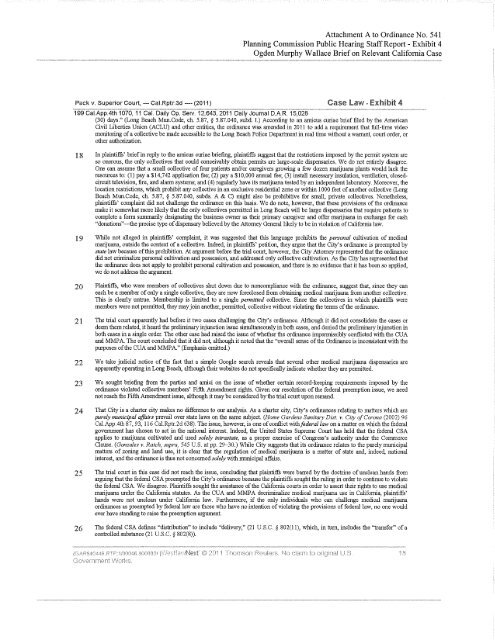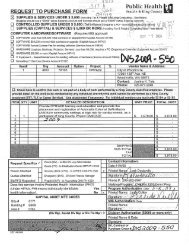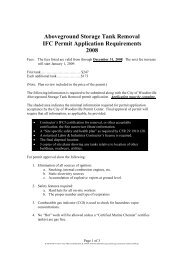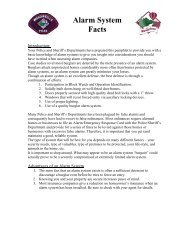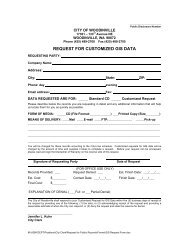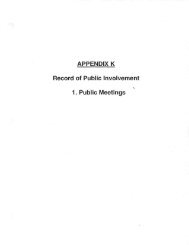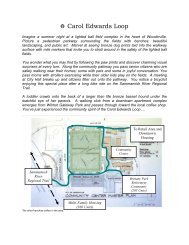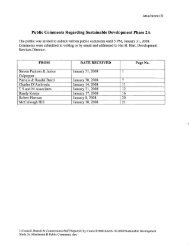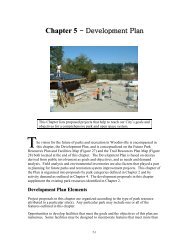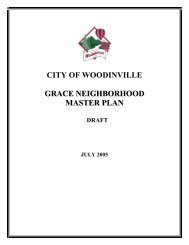Ord. 541 - City of Woodinville
Ord. 541 - City of Woodinville
Ord. 541 - City of Woodinville
- No tags were found...
You also want an ePaper? Increase the reach of your titles
YUMPU automatically turns print PDFs into web optimized ePapers that Google loves.
Attachment A to <strong>Ord</strong>inance No. <strong>541</strong>Planning Commission Public Hearing Staff Report - Exhibit 4Ogden Murphy Wallace Brief on Relevant California CasePack v. Superior Court, --- Cal.Rptr.3d ---- (2011) Case Law - Exhibit 4199 CaLApp.4th 1070, 11 Cal. Daily Op. Serv. 12,643, 2011 Daily Journal D.A.R. 15,028(30) days." (Long Beach Mun.Code, ch. 5.87, § 5.87.040, subd. I.) According to an amicus curiae brief filed by the AmericanCivil Liberties Union (ACLU) and other entities, the ordinance was amended in 2011 to add a requirement that full-time videomonitoring <strong>of</strong> a collective be made accessible to the Long Beach Police Department in real time without a warrant, court order, orother authorization.18 In plaintiffs' brief in reply to the amicus curiae briefing, plaintiffs suggest that the restrictions imposed by the permit system areso onerous, the only collectives that could conceivably obtain permits are large-scale dispensaries. We do not entirely disagree.One can assume that a small collective <strong>of</strong> four patients and/or caregivers growing a few dozen marijuana plants would lack theresources to: (1) pay a $14,742 application fee; (2) pay a $10,000 annual fee; (3) install necessary insulation, ventilation, closedcircuittelevision, fire, and alarm systems; and (4) regularly have its marijuana tested by an independent laboratory. Moreover, thelocation restrictions, which prohibit any collective in an exclusive residential zone or within 1000 feet <strong>of</strong> another collective (LongBeach Mun.Code, ch. 5.87, § 5.87.040, subds. A & C) might also be prohibitive for small, private collectives. Nonetheless,plaintiffs' complaint did not challenge the ordinance on this basis. We do note, however, that these provisions <strong>of</strong> the ordinancemake it somewhat more likely that the only collectives permitted in Long Beach will be large dispensaries that require patients tocomplete a form summarily designating the business owner as their primary caregiver and <strong>of</strong>fer marijuana in exchange for cash"donations"—the precise type <strong>of</strong> dispensary believed by the Attorney General likely to be in violation <strong>of</strong> California law.19 While not alleged in plaintiffs' complaint, it was suggested that this language prohibits the personal cultivation <strong>of</strong> medicalmarijuana, outside the context <strong>of</strong> a collective. Indeed, in plaintiffs' petition, they argue that the <strong>City</strong>'s ordinance is preempted bystate law because <strong>of</strong> this prohibition. At argument before the trial court, however, the <strong>City</strong> Attorney represented that the ordinancedid not criminalize personal cultivation and possession, and addressed only collective cultivation. As the <strong>City</strong> has represented thatthe ordinance does not apply to prohibit personal cultivation and possession, and there is no evidence that it has been so applied,we do not address the argument.20 Plaintiffs, who were members <strong>of</strong> collectives shut down due to noncompliance with the ordinance, suggest that, since they caneach be a member <strong>of</strong> only a single collective, they are now foreclosed from obtaining medical marijuana from another collective.This is clearly untrue. Membership is limited to a single permitted collective. Since the collectives in which plaintiffs weremembers were not permitted, they may join another, permitted, collective without violating the terms <strong>of</strong> the ordinance.21 The trial court apparently had before it two cases challenging the <strong>City</strong>'s ordinance. Although it did not consolidate the cases ordeem them related, it heard the preliminary injunction issue simultaneously in both cases, and denied the preliminary injunction inboth cases in a single order. The other case had raised the issue <strong>of</strong> whether the ordinance impermissibly conflicted with the CUAand MMPA. The court concluded that it did not, although it noted that the "overall sense <strong>of</strong> the <strong>Ord</strong>inance is inconsistent with thepurposes <strong>of</strong> the CUA and MMPA." (Emphasis omitted.)22 We take judicial notice <strong>of</strong> the fact that a simple Google search reveals that several other medical marijuana dispensaries areapparently operating in Long Beach, although their websites do not specifically indicate whether they are permitted.23 We sought briefing from the parties and amici on the issue <strong>of</strong> whether certain record-keeping requirements imposed by theordinance violated collective members' Fifth Amendment rights. Given our resolution <strong>of</strong> the federal preemption issue, we neednot reach the Fifth Amendment issue, although it may be considered by the trial court upon remand.24 That <strong>City</strong> is a charter city makes no difference to our analysis. As a charter city, <strong>City</strong>'s ordinances relating to matters which arepurely municipal affairs prevail over state laws on the same subject (Home Gardens Sannmy Dist. v. <strong>City</strong> <strong>of</strong> Corona (2002) 96Cal.App.4th 87, 93, 116 Cal. Rptr.2d 638). The issue, however, is one <strong>of</strong> conflict with federal law on a matter on which the federalgovernment has chosen to act in the national interest. Indeed, the United States Supreme Court has held that the federal CSAapplies to marijuana cultivated and used solely intrastate, as a proper exercise <strong>of</strong> Congress's authority under the CommerceClause (Gonzales v. Raich, supra, 545 U.S. at pp. 29 30.) While <strong>City</strong> suggests that its ordinance relates to the purely municipalmatters <strong>of</strong> zoning and land use, it is clear that the regulation <strong>of</strong> medical marijuana is a matter <strong>of</strong> state and, indeed, nationalinterest, and the ordinance is thus not concerned solely with municipal affairs.25 The trial court in this case did not reach the issue, concluding that plaintiffs were barred by the doctrine <strong>of</strong> unclean hands fromarguing that the federal CSA preempted the <strong>City</strong>'s ordinance because the plaintiffs sought the ruling in order to continue to violatethe federal CSA. We disagree. Plaintiffs sought the assistance <strong>of</strong> the California courts in order to assert their rights to use medicalmarijuana under the California statutes. As the CUA and MMPA decriminalize medical marijuana use in California, plaintiffs'hands were not unclean under California law. Furthermore, if the only individuals who can challenge medical marijuanaordinances as preempted by federal law are those who have no intention <strong>of</strong> violating the provisions <strong>of</strong> federal law, no one wouldever have standing to raise the preemption argument26 The federal CSA defines "distribution" to include "delivery," (21 U.S.C. § 802(11), which, in turn, includes the "transfer" <strong>of</strong> acontrolled substance (21 U.S.C. § 802(8)).


